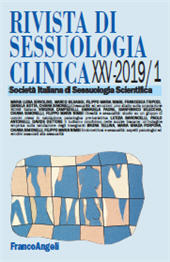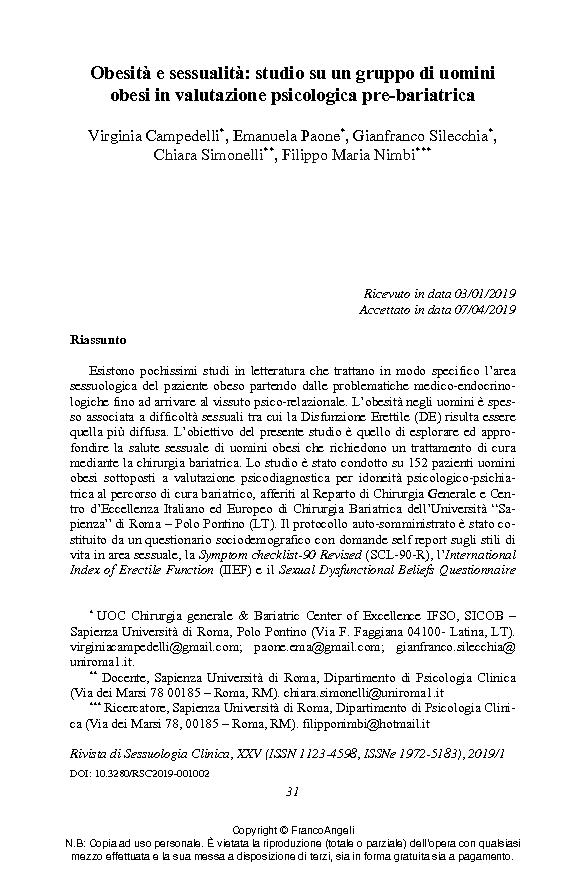Obesità e sessualità : studio su un gruppo di uomini obesi in valutazione psicologica pre-bariatrica
31-49 p.
Esistono pochissimi studi in letteratura che trattano in modo specifico l'area sessuologica del paziente obeso partendo dalle problematiche medico-endocrino-logiche fino ad arrivare al vissuto psico-relazionale. L'obesità negli uomini è spesso associata a difficoltà sessuali tra cui la Disfunzione Erettile (DE) risulta essere quella più diffusa. L'obiettivo del presente studio è quello di esplorare ed approfondire la salute sessuale di uomini obesi che richiedono un trattamento di cura mediante la chirurgia bariatrica. Lo studio è stato condotto su 152 pazienti uomini obesi sot-toposti a valutazione psicodiagnostica per idoneità psicologico-psichiatrica al percorso di cura bariatrico, afferiti al Reparto di Chirurgia Generale e Centro d'Eccellenza Italiano ed Europeo di Chirurgia Bariatrica dell'Università "Sapienza" di Roma ‒ Polo Pontino (LT).
Il protocollo auto-somministrato è stato costituito da un questionario sociodemografico con domande self report sugli stili di vita in area sessuale, la Symptom checklist-90 Revised (SCL-90-R), l'International Index of Erectile Function (IIEF) e il Sexual Dysfunctional Beliefs Questionnaire (SDBQ). I risultati di questo studio esplorativo evidenziano una sofferenza nell'area della sessualità in cui interagiscono anche fattori cognitivi come le creenze stereotipate sul genere e sull'attività sessuale. [Testo dell'editore]
There are a few studies in the literature dealing specifically with the sexuality of obese patients, from the medical-endocrinological perspective to the psychosocial experience. Obesity in men is often associated with sexual difficulties, whereas the Erectile Dysfunction (ED) is the most reported. The main aim of the present study was to explore the sexual health of obese men asking for bariatric surgery. The study addressed 152 obese men undergoing the psychodiagnostic evaluation for bariatric surgery suitability, referring to the Department of General Surgery and Italian and European Excellence Center of Bariatric Surgery of the "Sapienza" University of Rome ‒ Polo Pontino (LT).
The self-administered protocol consisted of a sociodemographic questionnaire with questions on lifestyles and sexual health, the Symptom Checklist-90 Revised (SCL-90-R), the International Index of Erectile Function (IIEF) and the Sexual Dysfunctional Beliefs Questionnaire (SDBQ). The results of this exploratory study show that there is a significative damage reported in sexuality, in which cognitive factors such as stereotypical beliefs about gender and sexual activity play a role. The data showed that having a higher BMI seems to be a risk factor for sexual dysfunctions. Specifically, there is a decrease in all IIEF scale scores as BMI increases. Hypertension seems to play a key role for ED and for the general satisfaction of sexual life. If the patient is in a stable relationship and has a greater frequency of sexual activity, it results in an increase of sexual functioning.
The study shows that in obese men, the more the first complete sexual intercourse is delayed in life, the more problems are reported in sexuality, especially ED and a low satisfaction of sexual intercourses and senti-mental relationships. Instead, a good satisfaction of the first sexual experience leads to more positive scores in all the areas of sexual functioning, regardless of weight (BMI). Regarding to the psychological area, a significantly higher level of somatization emerged in the group of obese men compared to controls. The erec-tile functioning emerges as the most problematic sexual area in this cohort of men. In particular, 38,16% of obese men reported an ED, of which 21,05% was mild, 5,92% moderate and 11,18% severe.
Concerning the role played by dysfunctional sexual beliefs, obese men reported a higher presence of stereotypical beliefs related to the male figure than the general population. In the clinical group prevails the idea that man have always to be ready for having a sexual activity, that the erec-tion is central for the satisfaction of the partner and for this reason it must always be maintained until the end of every sexual intercourse. These beliefs stimulate a highly performing experience, which prevents from a positive sexual experience and may negatively affect the perceived sexual distress. According to this result, a higher level of sexual conservatism was also found in obese men compared to controls. The present study emphasizes the importance of psychological and cul-tural factors related to sexuality and body experience, elements that in a good holistic treatment should be taken into account for the improvement of the patient's quality of life. [Publisher's text]
Ist Teil von
Rivista di sessuologia clinica : 1, 2019-
Artikel aus derselben Ausgabe (einzeln erhältlich)
-
Informationen
ISSN: 1972-5183
KEYWORDS
- Obesity, sexuality, male sexual dysfunction, erectile dysfunction, bariatric surgery
- Obesità, sessualità, disfunzione sessuale maschile, disfunzione erettile, chirurgia bariatrica



